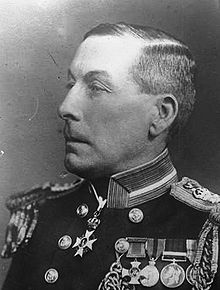Sir Reginald Bacon
| Sir Reginald Bacon | |
|---|---|

Reginald Bacon in 1915
|
|
| Born |
6 September 1863 Wiggonholt, West Sussex |
| Died | 9 June 1947 (aged 83) |
| Allegiance | United Kingdom |
| Service/branch | Royal Navy |
| Years of service | 1877–1909 1914–1919 |
| Rank | Admiral |
| Commands held |
Dover Patrol HMS Dreadnought HMS Hazard |
| Battles/wars |
Benin Expedition of 1897 First World War |
| Awards |
Knight Commander of the Order of the Bath Knight Commander of the Royal Victorian Order Distinguished Service Order |
Admiral Sir Reginald Hugh Spencer Bacon, KCB, KCVO, DSO (6 September 1863 – 9 June 1947) was an officer in the Royal Navy noted for his technical abilities. He was described by the First Sea Lord, Admiral Sir Jacky Fisher, as the man "acknowledged to be the cleverest officer in the Navy".
Reginald was born at Wiggonholt in West Sussex, the son of the parish rector, Rev. Thomas Bacon, and his wife, Lavinia Emma, the daughter of George Shaw of Teignmouth in Devon. Rev. Thomas was the nephew of the industrialist, Anthony Bushby Bacon of Elcot Park in Berkshire and the grand-uncle of the historian, Emma Elizabeth Thoyts, of Sulhamstead House, also in Berkshire.
Reginald entered the Navy in 1877, qualified as a torpedo lieutenant, and first came to wider notice as commander of a flotilla of torpedo boats in the British naval manoeuvres of 1896. In 1897 he served as a member of the British punitive expedition to Benin, and on his return from active service wrote the book Benin, the City of Blood (1897), describing the campaign.
Promoted to captain in 1900, he left the Mediterranean Station and, was appointed to the new position of Inspecting Captain of Submarines and given the task of introducing and developing the Royal Navy's earliest submarine boats. In August 1901 came the accompanying appointment as captain of HMS Hazard, which had recently been converted into the world´s first submarine depot ship. He was the acknowledged possessor of a fine technical brain, and Fisher's enthusiasm for his hardly hindered his career. That the Admiralty shared Fisher's impression of Bacon is evident not only in its decision to appoint so junior a captain to a comparatively senior position, but also in the laudatory minutes that attached themselves to Bacon's official reports.
...
Wikipedia
